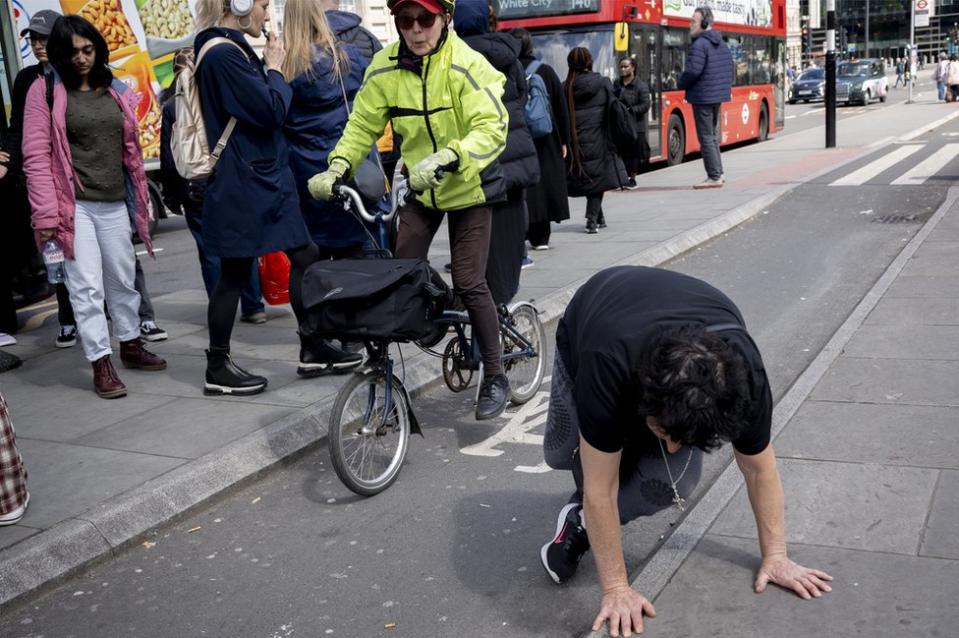London transport: Call for ban of 'floating' bus stops
Campaigners have called for a ban of so-called floating bus stops in London.
The design, which has a cycle lane between the stop and the pavement, is intended to allow bus passengers to get on and off safely while cyclists can keep moving.
Transport for London (TfL), which has funded 160 of the stops, says the likelihood of being injured by a cyclist at a bypass is "very low".
The Department for Transport says schemes should be accessible to all.
The National Federation of the Blind UK's (NFB) has produced a petition which as been signed by more than 270 organisations and will be handed in to Downing Street later.
It comes after a video posted by the NFB that shows what it describes as "the chaotic and downright dangerous situation" at a bus stop bypass outside St Thomas' Hospital near Waterloo.
It showed a pedestrian walking into a cycle lane and falling to the ground after a cyclist knocks him off balance.
"These designs are not safe and they need to be urgently halted," it posted.
Age UK London, the London Sports Club for the Blind and Disability Rights UK are among the signatories of the petition.
Last month, the Mayor of London Sadiq Khan told the BBC the "floating" stops were installed during his second term because "a disproportionate number of cyclists" had been "injured and killed as a consequence of buses".
Sarah Gayton, street access campaign coordinator for the NFB, stressed that the organisation was not calling for the wholesale removal of cycle lanes.
"We're calling for a redesign of cycle lanes around bus stops so the bus can pull up directly to the pavement so blind and visually impaired people can board the bus directly without having to cross - or step into - a cycle lane," she said.
"Blind people have fewer choices. Cyclists can see and stop. We want the floating bus stops and the shared use bus borders to be removed."
Caroline Russell, a Green Party member of the London Assembly, backed the "floating" bus stops due to what she said was "overwhelming" evidence that the design had reduced the number of people killed or seriously injured.
Speaking in the assembly, Ms Russell on Monday, she said: "We also have to acknowledge that there are people riding bikes who are inconsiderate.
"There are also people driving cars who are incredibly inconsiderate and it's the inconsiderate people in cars who overwhelmingly kill and injure."

Ms Russsell said that measures like tactile (raised) paving, clear zebra crossings and different coloured tarmac at floating bus stops could make them safer, as well as announcements on buses reminding people when a bus stop bypass is approaching.
She added: "It's all about avoiding getting into battle lines, looking at the evidence and making sure you're listening to people and particularly the most vulnerable in that transport hierarchy, which [includes] a blind person walking."
Christina Calderato, TfL's director of transport strategy and policy, said: "Keeping everyone travelling in the capital safe is our top priority and we're determined to make the network as inclusive as possible, which is why we have carried out an extensive review of safety at bus stop bypasses.
"Our analysis suggests that bus stop bypasses have not led to a reduction in bus stop use by older or disabled customers.
"Any moratorium on bus stop bypasses would put at risk the programme of work we are undertaking to improve cycle safety in London and encourage more people to cycle."
A Department for Transport spokesperson said: "TfL are responsible for these schemes in London but we expect them to engage with disability groups and follow our guidance which clearly sets out that all infrastructure designs should be accessible for everyone."
Additional reporting by Robert Firth, Local Democracy Reporting Service
Listen to the best of BBC Radio London on Sounds and follow BBC London on Facebook, X and Instagram. Send your story ideas to hello.bbclondon@bbc.co.uk

